Bears Struggle to Hibernate Due to Unseasonably Warm Weather in Russia’s Amur Region are wandering in a state of confusion and distress.
According to the Amur Wildlife Protection Bureau, bears in Siberia are wandering in a state of “slumbering.”
The bears are prepared for hibernation, having accumulated the necessary fat reserves to sleep through the winter, but the warm temperatures in November have kept them awake past their usual bedtime.

A North American grizzly bear standing in the snow in West Yellowstone, Montana, USA. (Photo: Mark Newman via Getty Images).
Most of the sleepless bears are males, while females with their cubs have returned to their dens “on schedule.”
Bears typically spend the winter hibernating in dens, waking in the spring when food becomes available again. Unlike other hibernating animals, bears decide when to begin their long seasonal sleep based on several signals, including food availability and temperature.
Unusual Heat Delays Bears’ Hibernation
This autumn, the Amur region, which shares a border with China in Russia’s Far East, experienced unusually high and record temperatures in October and November, as reported by the Moscow Times. And this may delay the bears’ hibernation.
Oivind Toien, an animal physiologist and research assistant at the Institute of Arctic Biology at the University of Alaska Fairbanks, suggested that waterlogged dens could also be a factor. He stated: “Temperatures above freezing in wet, snowy conditions can cause water to melt into the dens, making it uncomfortable for the bears to stay inside.“
Hibernation timing issues seem to affect males more than females and cubs.





















































